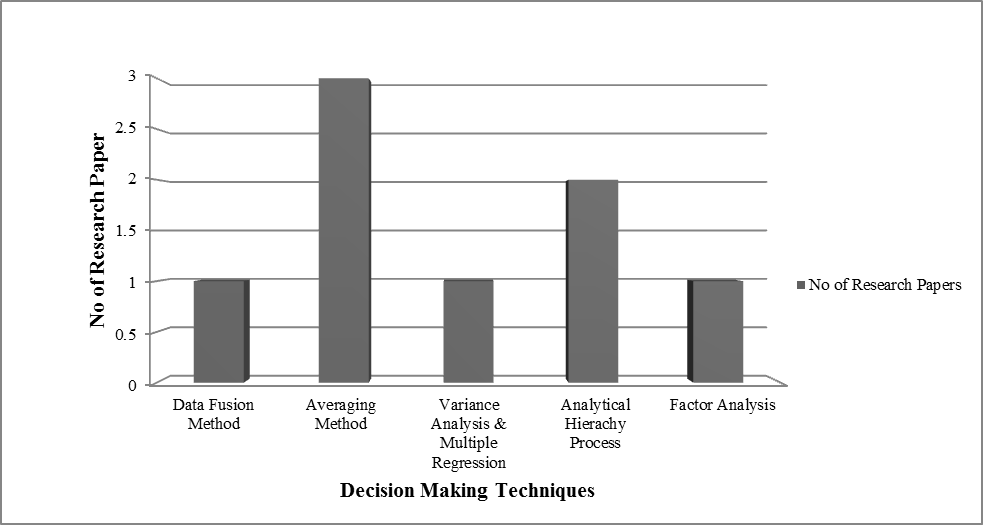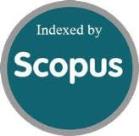A Review of the State-of-the-Art on Combining Multiple NDT Techniques in Terms of Precise Fault Detection
Keywords:
Condition Monitoring, Corrective Actions, Fault Detection, Non destructive testing (NDT)Abstract
The present industrial scenario demands optimum quality, feasible processing time and enhanced machine availability to cope-up with continuously increasing customer expectations. To achieve this target, it is mandatory to ensure the optimum performance and higher availability of machinery. Therefore, the present work begins with, review of the research work of different researchers, which includes the applied combinations from year 2000-2016 proceed with discussion on the parameters being checked before making combination of NDT and finally, covers the maintenance performance parameters for quantifying improvement in performance after combining NDT. The result indicates that very few researches uses combination of NDT’s, in areas like aeronautical, compressors etc., and most of the works done in composites to be tested without using any decision making technique. The researchers and practitioners can use the outcome of this work as a guideline for combining multiple NDT technique to achieve precise fault prediction and forecasting of upcoming failures.
References
X. Escaler, E. Egusquiza, M. Farhat, F. Avellan, and M. Coussirat, “Detection of cavitation in hydraulic turbines,” Mechanical Systems and Signal Processing, vol. 20, no. 4, pp. 983-1007, May 2011.
C. Garnier, M. L. Pastor, E. Florent, and B. Lorrain, “The detection of aeronautical defects in situ on composite structures using Non Destructive Testing,” Composite Structures, vol. 93, no. 5, pp. 1328-1336, April 2011.
M. Wilcox and G. Downes, A brief description of NDT techniques, Toronto: NDT Equipment Limited, 2003.
T. D’Orazioa, M. Leoa, A. Distante, C. Guaragnella, V. Pianese, and G. Cavaccini, “Automatic ultrasonic inspection for internal defect detection in composite materials,” NDT&E International, vol. 41, no. 2, pp. 145-154, March 2008.
J. Krautkramer and H. Krautkramer, Ultrasonic testing of materials, New York: Springer Publications, 1990.
P. J. Shull and B. Tittmann, Theory techniques & applications, New York: Taylor & Francis, 2002.
Y. K. Zhu, G. Y. Tian, R. S. Lu, and H. Zhang, “A review of optical NDT technologies,” Sensors, vol. 11, no. 8, pp.7773-7798, August 2011.
S. A. Halim, A. Ibrahimand and Y. Manurung, “A review on automated inspection and evaluation system of weld defect detection on radiographic image,” International Journal of Recent Scientific Research, vol. 12, pp.1019-1023, December 2012.
V. S. Khangar and S. B. Jaju, “A review of various methodologies used for shaft failure analysis,” International Journal of Emerging Technology and Advanced Engineering, vol. 2, no. 6, pp. 50-54, June 2012.
B. Li, Y. F. Shen, and W. Y. Hu, “The study on defects in aluminum 2219-T6 thick butt friction stir welds with the application of multiple non-destructive testing methods,” Materials and Design, vol. 32, no. 4, pp. 2073-2084, April 2011.
R. Ambu, F. Aymerich, F. Ginesu, and P. Priolo, “Assessment of NDT interferometric techniques for impact damage detection in composite laminates,” Composites Science and Technology, vol.66, no. 2, pp.199-205, February 2006.
M. K. Lim and H. Cao, “Combining multiple NDT methods to improve testing effectiveness,” Construction and Building Materials, vol. 38, pp. 1310-1315, January 2013.
X. De´robert, C. Aubagnac, and O. Abraham, “Comparison of NDT techniques on a post-tensioned beam before its autopsy,” NDT&E International, vol. 35, no. 8, pp.541-548, December 2002.
Aastroem Thomas, “From Fifteen to Two Hundred NDT- methods in Fifty Years,” Proc. of 17th World Conf. Nondestructive Testing, October 2008, pp. 1-13.
Z. Q. Su, L. Ye, and Y. Lu, “Guided Lamb waves for identification of damage in composite structures: a review,” Journal of Sound and Vibration, vol. 295, no. 3, pp. 753-780, August 2006.
D. Horn and W. R. Mayo, “NDE reliability gains from combining eddy-current and ultrasonic testing,” NDT&E International, vol. 33, no. 6, pp. 351-362, September 2000.
J. W. Wilson, G. Y. Tian, and S. Barrans, “Residual magnetic field sensing for stress measurement,” Sensors and Actuators A: Physical, vol. 135, no. 2, pp. 381-387, April 2007.
M. R. Kaphle, A. Tan, D. Thambiratnam, and T. H. Chan, “Review: acoustic emission technique - opportunities, challenges and current work at QUT,” Proc. 1st International Postgraduate Conf. Engineering, Designing and Developing the Built Environment for Sustainable Wellbeing, QUT Press, April 2011, pp. 312-317.
Y. Y. Hung, Y. S. Chen, S. P. Ng, L. Liu, Y. H. Huang, B. L. Luk, R. W. L. Ip, C. M. L. Wu, and P. S. Chung, “Review and comparison of shearography and active thermography for nondestructive evaluation,” Materials Science and Engineering: R: Reports, vol. 64, no. 5, pp. 73-112, May 2009.
P. Jayaswal, A. K. Wadhwani, and K. B. Mulchandani, “Machine fault signature analysis,” International Journal of Rotating Machinery, vol. 2008, March 2008.
A. Verma and S. Srivastava, “Review on condition monitoring techniques oil analysis,” Thermography and Vibration Analysis, International Journal of Enhanced Research in Science Technology and Engineering, vol. 3, pp. 18-25, 2014.
T. H. Loutas, D. Roulias, E. Pauly, and V. Kostopoulos, “The combined use of vibration, acoustic emission and oil debris on-line monitoring towards a more effective condition monitoring of rotating machinery,” Mechanical Systems and Signal Processing, vol. 25, no. 4, pp. 1339-1352, May 2011.
R. Raišutis, E. Jasiūnienė, R. Šliteris, and A. Vladišauskas, “The review of non-destructive testing techniques suitable for inspection of the wind turbine blades,” Ultragarsas (Ultrasound), vol. 63, no. 1, pp. 26-30, 2008.
P. Tchakoua, R. Wamkeue, M. Ouhrouche, F. Slaoui-Hasnaoui, A. T. Tameghe and G. Ekemb, “Wind turbine condition monitoring: state-of-the-art review, new trends, and future challenges,” Energies, vol. 7, no. 4, pp. 2595-2630, April 2014.
D. Breysse, “Nondestructive evaluation of concrete strength: An historical review and a new perspective by combining NDT methods,” Construction and Building Materials, vol. 33, pp. 139-163, August 2012.
Z. Hameed, Y. S. Hong, Y. M. Cho, S. H. Ahn and C. K. Song, “Condition monitoring and fault detection of wind turbines and related algorithms: a review,” Renewable and Sustainable Energy Reviews, vol. 13, no. 1, pp. 1-39, January 2009.
P. Bieder, G. Dobmann, M. Kröning, J. Liu and J. G. Ribero, “Current NDT research & development for NPP inspections,” Proc. of 17th World Conf. Nondestructive Testing, June 2008.
M. Winkelmans and M. Wevers, “Non-Destructive testing for corrosion monitoring in chemical plants,” Journal of Acoustic Emission, vol. 20, pp. 206-217, January 2002.
D. Horn, “Reliability analysis combining multiple inspection techniques,” Proc. of European Conf. NDT, vol. 2006, pp. 1-9, 2006.
D. M. McCann and M. C. Forde, “Review of NDT methods in the assessment of concrete and masonry structures,” NDT&E International, vol. 34, no. 2, pp. 71-84, March 2001.
B. W. Drinkwater and P. D. Wilcox, “Ultrasonic arrays for non-destructive evaluation: a review,” NDT&E International, vol. 39, no. 7, pp. 525-541, October 2006.
R. Ruzek, R. Lohonka and J. Jironc, “Ultrasonic C-Scan and shearography NDI techniques evaluation of impact defects identification,” NDT&E International, vol. 39, no. 2, pp. 132-142, March 2006.
A. El Kouche and H. S. Hassanein, “Ultrasonic Non-Destructive Testing (NDT) using wireless sensor networks,” Procedia Computer Science, vol. 10, pp. 136-143, December 2012.
O. Abraham and X. De´robert, “Non-destructive testing of fired tunnel walls: the Mont-Blanc Tunnel case study,” NDT&E International, vol. 36, no. 6, pp. 411-418, September 2003.

Published
How to Cite
Issue
Section
License
Copyright (c) 2017 International Journal of Engineering and Technology Innovation

This work is licensed under a Creative Commons Attribution-NonCommercial 4.0 International License.
Copyright Notice
Submission of a manuscript implies: that the work described has not been published before that it is not under consideration for publication elsewhere; that if and when the manuscript is accepted for publication. Authors can retain copyright in their articles with no restrictions. Also, author can post the final, peer-reviewed manuscript version (postprint) to any repository or website.

Since Jan. 01, 2019, IJETI will publish new articles with Creative Commons Attribution Non-Commercial License, under Creative Commons Attribution Non-Commercial 4.0 International (CC BY-NC 4.0) License.
The Creative Commons Attribution Non-Commercial (CC-BY-NC) License permits use, distribution and reproduction in any medium, provided the original work is properly cited and is not used for commercial purposes.



.jpg)


